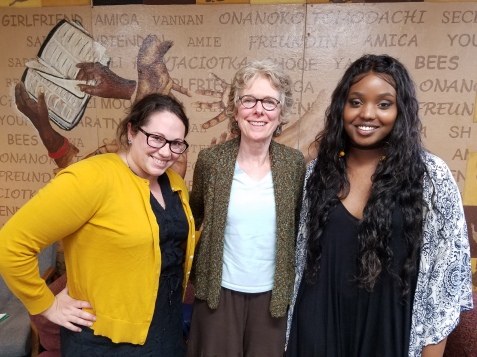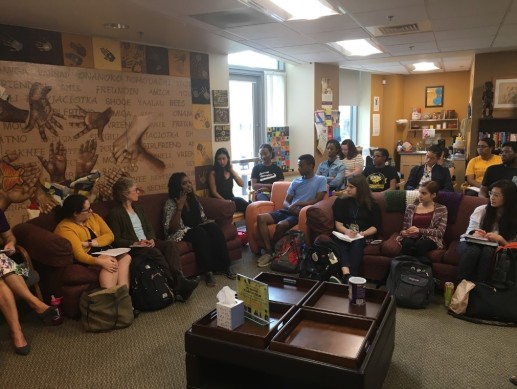Women in Activism: a Roundtable Round-Up
The Women’s Center ended our spring roundtable series on a high note last Thursday with Women in Activism. If you weren’t able to join us for our lively discussion, here’s a short round-up of what you missed!
This semester’s roundtable series focused on the ways that women are made invisible and silenced within certain spaces. For this discussion on activism, we began with a short visual presentation that illustrates how women often go unseen within the very movements they’ve worked to create.
Our three panelists shared their insights on the topic to help launch our discussion: Dr. Beverly Bickel from Language, Literacy and Culture (LLC); Iman Said, a junior Psychology major and Baltimore-based activist; and Jacki Stone, Community Health and Safety Specialist and a graduate student in LLC.

from left to right: Panelists Jackie Stone, Beverly Bickel, and Iman Said
Important points of discussion are as follows:
- People of various identities carry different forms of knowledge with them; in order to build coalitions and activist movements, we must value and allow space for multiple perspectives, lived experiences, and ways of knowing.
- Women have always been activists, but not always publicly visible—especially those with multiply marginalized identities.
- Stereotypes can often lead to negative perceptions of women who speak up and engage in activism (e.g. “bossy,” “Feminazi,” or “angry Black woman” stereotypes).
- Perfectionism was cited as a common barrier women face. This leads to women doubting their own knowledge and capabilities as activists and as leaders, as seen with imposter syndrome.
- Activism looks different for everyone—it may be artistic expression, critical conversations at home, or part of your profession. Activism is not limited to hitting the streets chanting.
- All activists must make room to learn and grow. It’s important to understand that we don’t know everything, that it’s okay to speak less, listen more, and humble ourselves within the work that we do. This way, we make space for those who we tend not to hear, and alter our perspectives based upon the information others give us.
Overall, we had a very rewarding discussion with our panelists, as well as our community members who shared their own experiences and insights!

For more information on the topics discussed at the event, check out the resources below:
- A short biography of the women behind Black Lives Matter
- The underrepresentation of Indigenous women in mainstream feminism
- Local activist Brittany Oliver on why she didn’t attend the Women’s March on Washington in January
Posted: April 24, 2017, 5:13 PM